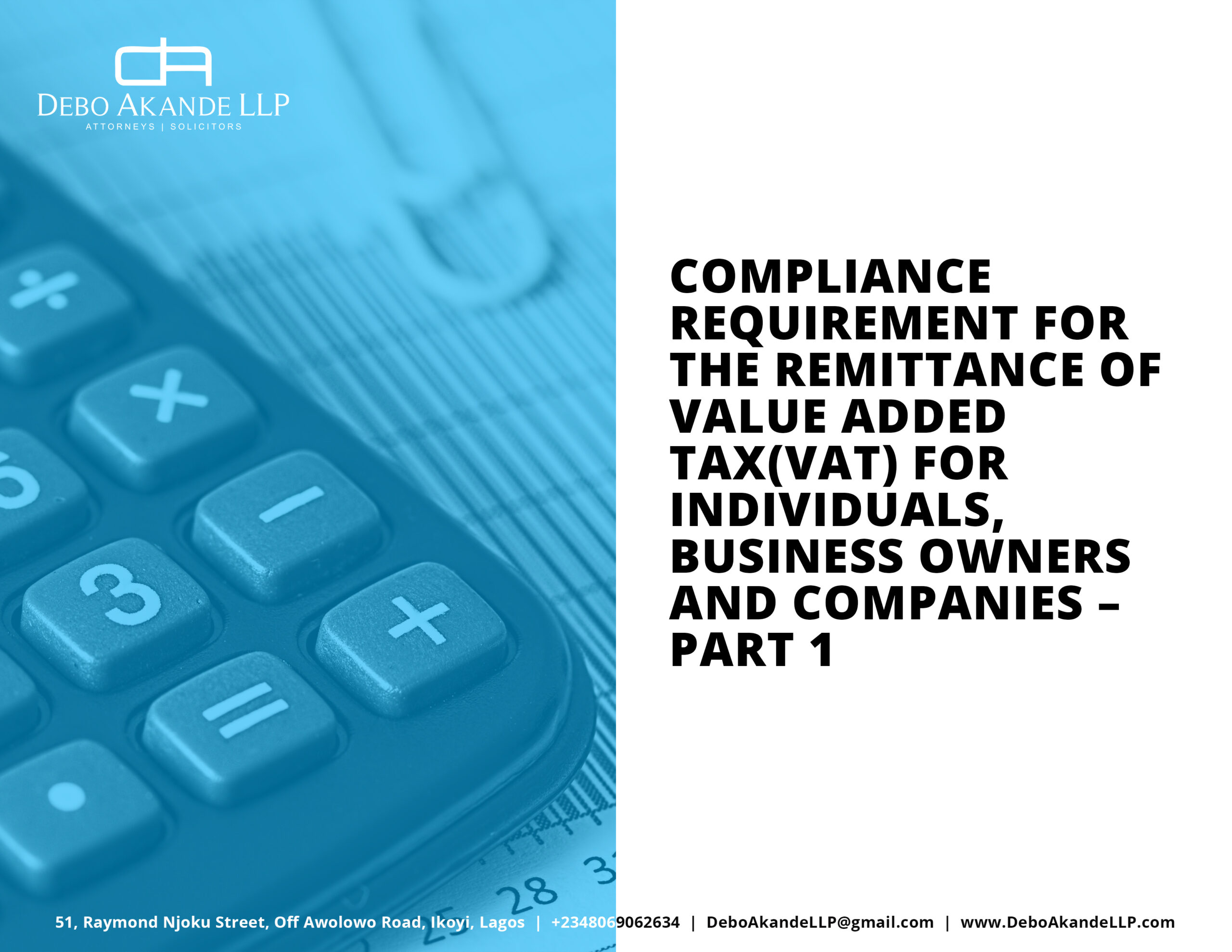INTRODUCTION
What is Value Added Tax?
Value Added Tax (VAT) is a consumption tax paid when goods are purchased, or services are enjoyed. In simple terms, VAT is a tax levied on consumption. It is payable ONLY when taxable goods or services are consumed. Consequently, if there is no consumption the tax is not collectable.
BRIEF HISTORY
VAT was introduced by the enactment of the Value Added Tax (VAT) Act in 1993 to replace the Sales Tax. It is collected by the Federal Inland Revenue Service (FIRS) on behalf of the Federal Government of Nigeria. This Tax is paid directly into the VAT Pool Account with the Central Bank of Nigeria (CBN) and is shared collectively by the Federal, State and Local Governments based on the statutory sharing formula, which currently is: 15%, 50% and 35% respectively.
ABOUT YOUR TAX IDENTIFICATION NUMBER
All registered persons under the VAT administration are issued with TIN on registration with the FIRS after presentation of relevant documents[i]. The documents required to be presented for receipt of your TIN number are:
FOR INDIVIDUALS
- Duly completed Taxpayer Registration Input Form
- Valid means of identification: International Passport/National Identity card/Drivers Licence
- Valid Email address and telephone number.
FOR COMPANIES AND BUSINESSES
- Duly completed Tax Duly completed Taxpayer Registration Input Form Certificate of Incorporation/Registration
- Memorandum of Association and articles of Association (where applicable)
- Documents containing the following information
- Registered address of the company/business Principal place of business
- Date of commencement of business
- Date of commencement of business and accounting year end
- Name of bankers, Auditors and Tax consultants
- Valid e-mail addresses and telephone numbers
- Utility bill bearing business address or company address.
WHAT ARE TAXABLE GOODS AND SERVICES?
All goods manufactured/assembled in or brought into Nigeria, except those specifically exempted under the VAT Act. Examples of taxable goods include jewellery, shoes, bags, television e.t.c
All services rendered by any person in Nigeria except those specially exempted under the VAT Act. Examples of taxable services are those rendered by Lawyers, Engineers, Accountants, Contractors and Consultants e.t.c
On the other hand there are non-Vatable goods and services which are not subject to Tax and these include; All medical and pharmaceutical products, basic food items, books and educational materials, baby products, fertilizers, locally produced agricultural and veterinary medicine, farming machinery and farming transportation equipment[3]. Non-VATable services are services which are not subject to 7.5% VAT and these include Medical services, Service rendered by community banks, people’s banks and mortgage institutions, plays and performances conducted by educational institutions as part of learning and all exported services.
It becomes germane to state that entertainment services and catering services are also taxable. However, when a contractor/supplier supplies goods that are exempted from VAT, VAT need not be paid on those goods, but the contractor/supplier must file VAT returns as at when due.
FIRS EXPECTATIONS FROM TAXABLE PERSONS UNDER THE VAT ACT
A taxable person under the Value Added Tax Act (VATA) Cap VI LFN 2004 is a person (other than a public authority acting in that capacity), who independently carries out in any place an economic activity as a producer, wholesaler, trader, supplier of services(including mining and other related activities). In other words, a taxable person is one who trades in taxable goods and services for a consideration.
All taxable persons are now required to add 7.5% VAT on all taxable transactions (goods or services). This should be clearly stated on the invoices issued to customers[4].
The administration of the VAT Act relies heavily in proper record keeping by taxable persons. All taxable persons are to ensure that records of all their business transactions are properly kept.
The VAT Act also requires all taxable persons to file VAT returns using form 002, to the Tax office on or before the 21 st day of the month following the month of transaction. Remittance of VAT is to be made concurrently with the filing of VAT returns i.e. 21 days after the month of transaction. These remittances are to be made only through approved collecting banks and other payment channels e.g. Taxpay, Remita, Internet banking etc.
All taxable persons are required to notify FIRS of any changes regarding their operations e.g. change of address, business line or regarding and compliance challenges faced by them.
One of the most notable changes by the new Finance Act which came into law in February apart from a 50% increase in VAT from 5% to 7.5% is section 38 of the Finance Act which substitutes and provides a new Section 15 of the Value Added Tax Act which provides:
“A taxable person who in the course of business has made taxable supplies or expects to make taxable supplies, the value of which either singularly or cumulatively in any calendar year is N25,000,000 or more shall render to the Service on or before the 21 st day of every month in which this threshold is achieved and on or before the same day in successive months thereafter, a return of the input tax paid and output tax collected by him in the preceding month in such a manner as the Service may describe.”
The implication of this is that small businesses, individuals, entities and other taxable persons whose taxable supplies fall without this threshold are not caught by this provision. Despite the widely held view that any one who does not fall within this threshold above is exempted from registering, remitting, issuing tax invoice and collecting VAT, the correct position is that such individuals and entities are mandated to register and file their returns monthly.
In the next series I will be sharing some insight on the expectations of the FIRS from Ministries, Departments, NGO’S, Federal government contractors and approved collecting banks in the remittance of VAT. We will also discuss how VAT is calculated at different levels of production from the manufacturer to the end consumer.

